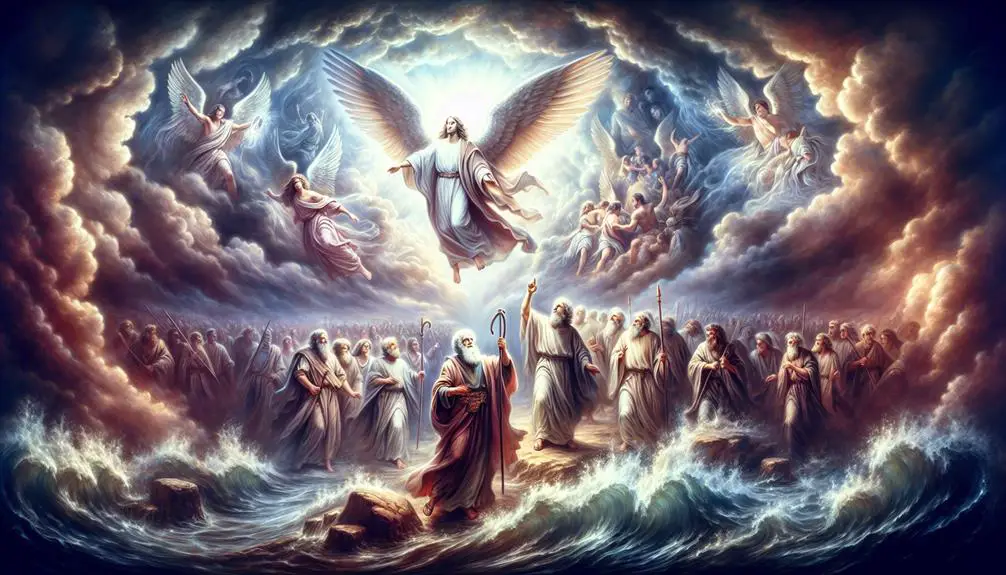Kneel into the mysteries of divine envoys in the Bible, uncovering messages that transcend time and invite deep reflection.

God's Messengers in the Bible
Just as a king sends his envoys to convey his decrees across distant lands, the Bible is replete with instances where God dispatched His messengers to guide, warn, and deliver His word to humanity.
You've likely heard about Gabriel's announcements or Michael's protective endeavors, but have you ever pondered the depth of their missions or the implications for both their time and ours?
The stories of these celestial beings not only captivate the imagination but also invite you to explore the rich tapestry of divine communication woven throughout the Scriptures.
Let's uncover what messages they carry for us today.
Key Takeaways
- Angels serve as divine messengers, bridging the gap between God and humanity, embodying His presence and authority.
- Gabriel's critical announcements in the Bible underscore the role of angels in altering human history and individual destinies.
- Michael symbolizes God's commitment to protect creation, representing the triumph of good over evil through celestial battles.
- Angels also communicate God's wisdom and guidance through dreams, highlighting a personal and introspective mode of divine interaction.
The Role of Angels

In biblical scripture, angels serve as divine messengers, executing God's will and communicating His messages to humanity. These celestial beings, integral to the heavenly hierarchy, embody God's presence and authority, bridging the divine and the mortal realms. Within this spiritual framework, the roles of Seraphim stand out as particularly significant.
You'll find that the Seraphim, often depicted as the highest order of angels, occupy a pivotal position in the heavenly hierarchy. Their primary duty, as elucidated in scripture, centers around the worship of God. They're described as surrounding His throne, continuously proclaiming His holiness and glory. This ceaseless adoration underscores a fundamental aspect of their role: to exemplify the utmost devotion and reverence for the Creator.
Moreover, the Seraphim's roles extend beyond mere adoration. They act as purifiers and sanctifiers within the celestial domain. This is vividly illustrated in the prophet Isaiah's vision, where a Seraphim cleanses Isaiah's lips with a burning coal, symbolizing the purification necessary for the prophet to convey God's messages. Such interactions highlight the Seraphim's function in preparing individuals to receive and transmit divine revelations.
Your understanding of the Seraphim's roles within the heavenly hierarchy enriches your grasp of the broader spiritual ecosystem. These beings aren't merely worshippers but are instrumental in maintaining the sanctity and purity essential for divine-human communication. Their existence and actions embody the intricate balance between God's transcendence and immanence, making them key players in the unfolding of the divine plan.
Gabriel's Announcements

Reflecting on the pivotal roles of the Seraphim in celestial worship and purification, we now turn our attention to Gabriel, a messenger whose announcements have profoundly shaped biblical narratives and human understanding of divine intervention. Gabriel's identity as a primary communicator of God's will is central to his role in the biblical texts. His appearances are marked by critical messages that have altered the course of human history and individual destinies within the scriptural tradition.
Analyzing Gabriel's announcements, you'll recognize their dual nature; they're both revelations and tests of faith. When Gabriel informs Zechariah of John the Baptist's impending birth, the disbelief encountered underscores the human struggle with faith in the face of divine promises. Similarly, Gabriel's annunciation to Mary about the birth of Jesus is a cornerstone of Christian theology, illustrating the intersection of divine intervention and human agency. These moments highlight the announcement impacts, where the reception of Gabriel's messages signifies a turning point, demanding faith and action from the recipients.
Moreover, Gabriel's identity as a messenger reveals the character of God's communication with humanity. It's direct, purposeful, and intertwined with the unfolding of God's plan for salvation. Through Gabriel, we see a God who chooses to engage with humanity, guiding and revealing His will in ways that are both mysterious and deeply personal.
In essence, Gabriel's announcements aren't just historical or theological markers; they're invitations to understand the depth of divine love and the seriousness with which God engages with His creation. They prompt us to reflect on our own responses to divine revelations and the ways in which we're called to participate in God's unfolding plan.
Michael the Protector

Often overlooked, Michael stands as a formidable protector in biblical narratives, embodying God's commitment to safeguarding His creation. Within the rich tapestry of Archangel lore, Michael emerges not merely as a messenger, but as a warrior, pivotal in the orchestration of Heavenly battles. You'll find his presence a testament to the lengths to which divine forces will go to ensure the protection and guidance of humanity.
Delving deeper, Michael's role transcends mere intervention; it's a symbol of unwavering faith and the power of good to triumph over evil. In texts where his exploits are chronicled, Michael isn't just fighting; he's leading, demonstrating the virtues of courage and leadership. His battles aren't merely physical but represent the ongoing struggle between celestial forces of good and evil, highlighting the complexity of his character and the multifaceted nature of divine protection.
Analyzing Michael's narrative, you're invited to reflect on the broader implications of his actions. It's not just about the victories in battle; it's about what those victories signify. Michael's protection is a reassurance of God's omnipresence and His eternal vow to safeguard His creation from malevolent forces. Through Michael, you're reminded that while the battle between good and evil rages on, divine protection remains an unshakable constant.
In this scholarly exploration of Michael the Protector, you're encouraged to ponder the significance of Archangel lore within the biblical canon. Michael's enduring legacy in Heavenly battles serves as a powerful reminder of the strength and protection offered by faith, reinforcing the belief in a higher power steadfastly committed to the welfare of humanity.
Angels in the Exodus

Throughout the Exodus narrative, angels serve as pivotal agents of divine intervention, guiding and protecting the Israelites in their journey from bondage to freedom. This period, marked by miraculous events and divine manifestations, showcases the instrumental role of angels in executing God's will. You see, angel guidance isn't merely a backdrop in this story; it's a central theme that highlights the covenantal relationship between God and His people.
Angels in the Exodus are messengers of hope and instruments of God's power. Their presence reassures the Israelites of God's unwavering support and commitment to their liberation. Moreover, these celestial beings also serve as harbingers of divine warnings, most notably to Pharaoh. The warnings given to Pharaoh through angels underscore the seriousness of God's commands and the consequences of defiance. In this context, angels embody God's mercy, offering Pharaoh opportunities for repentance and compliance.
Analyzing these occurrences, you'll find that angel guidance during the Exodus isn't merely for direction or protection. It also establishes a framework for understanding divine justice and mercy. These celestial messengers bridge the gap between the divine and the earthly, making God's presence and intentions known in a tangible way.
In essence, angels in the Exodus exemplify God's direct intervention in human affairs, reflecting His power, justice, and mercy. Their roles as guides, protectors, and messengers of warning highlight the multifaceted ways in which God communicates with and cares for His people. This narrative, rich with angelic intervention, invites you to ponder the depth of God's commitment to His covenant and the lengths to which He'll go to fulfill His promises.
Divine Messengers in Dreams

While angels visibly guided the Israelites in the Exodus, divine messengers also communicate through dreams, offering profound insights and directives in a more personal, introspective manner. This method of communication taps into the rich tapestry of the human subconscious, serving as a conduit for divine wisdom and guidance. The Biblical narrative is replete with instances where dreams act as a pivotal medium for divine messages, underscoring the importance of dream interpretation and subconscious guidance in understanding God's will.
The scholarly examination of these dream encounters reveals a multifaceted approach by the divine to engage with humanity. Dreams provide a unique space where the temporal and the spiritual intersect, allowing individuals to receive messages that are often beyond the grasp of their conscious mind. This form of communication emphasizes the intimate relationship between the divine and the individual, where messages are tailored to the recipient's ability to comprehend and act upon them.
Analyzing these dream narratives, one discerns a pattern of God utilizing the subconscious as a canvas to impart wisdom, warnings, and prophecies. This method not only ensures the message is conveyed but also engages the individual's cognitive and spiritual faculties to interpret and apply the insights received. The act of dream interpretation thus becomes a crucial skill in deciphering the divine will, requiring a deep understanding of symbolic language and an openness to subconscious guidance.
In essence, these divine messengers in dreams represent an aspect of God's communication strategy that's deeply personal and reflective. They highlight the significance of paying attention to our dreams as potential channels for divine guidance, urging us to develop our interpretative skills to navigate life's challenges with divine wisdom.
Frequently Asked Questions
How Do Angels Communicate With Humans Outside of Dreams and Direct Announcements?
Angels communicate with you in ways beyond dreams and direct words. They often use angelic symbols and provide mysterious guidance. These symbols might appear in your everyday life, guiding you subtly but profoundly.
They're not just random signs; they're meant to direct you, offer comfort, or even warn you. Understanding these symbols requires a deep, reflective mindset, allowing you to interpret the angelic messages hidden in the ordinary.
Are There Instances Where Angels Intervened in Human Affairs Without Being Noticed?
Yes, there are instances where angels have intervened in human affairs without being noticed. They've often worn disguises or acted behind the scenes to offer subtle guidance. This approach allows them to influence events or assist individuals without drawing attention to their divine nature.
These interventions, while not always obvious, highlight the belief that celestial beings are constantly at work, subtly guiding and protecting humanity in accordance with divine will.
How Do Different Religious Traditions Interpret the Concept of Fallen Angels?
Different religious traditions offer varied interpretations of fallen angels, focusing on angel hierarchy and redemption views. Some see these beings as permanently estranged from the divine due to their rebellion, while others believe in possible redemption or transformation.
This divergence reflects broader theological perspectives on sin, forgiveness, and the nature of spiritual beings. Analyzing these views reveals the complexity of faith-based understandings of the cosmos and the roles of celestial entities within it.
What Roles Do Angels Play in the Afterlife According to Biblical Texts?
Imagine navigating the vast, mysterious expanse of the afterlife, where angels serve as your guiding stars. These celestial beings don't just stand as heavenly guidance; they're your afterlife escorts, ensuring you find your way.
According to biblical texts, angels play crucial roles, guiding souls, delivering messages of hope, and providing comfort in the transition. Their presence marks a divine intervention, ensuring the journey isn't taken alone, but with heavenly guidance at every step.
Can Humans Become Angels After They Die, According to Biblical Teachings?
According to biblical teachings, when you die, you can't become an angel. Angels are distinct beings created by God, part of a specific angelic hierarchy, not humans undergoing spiritual transformation. This concept is a common misconception but isn't supported by scripture.
Instead, humans and angels have different purposes and destinies. Your afterlife, as described in the Bible, involves a spiritual existence, but it doesn't include becoming an angel.
Conclusion
In your journey through the biblical narratives, you've encountered the celestial emissaries, angels, who've played pivotal roles from delivering monumental announcements to offering protection. Gabriel's revelations and Michael's unwavering guard stand as testaments to their divine duties.
Like a divine GPS, angels have guided characters through dreams and monumental events like the Exodus. These narratives not only enrich your faith but also underscore the profound belief in a heaven that's more bustling than Grand Central Station during rush hour.



Sign up